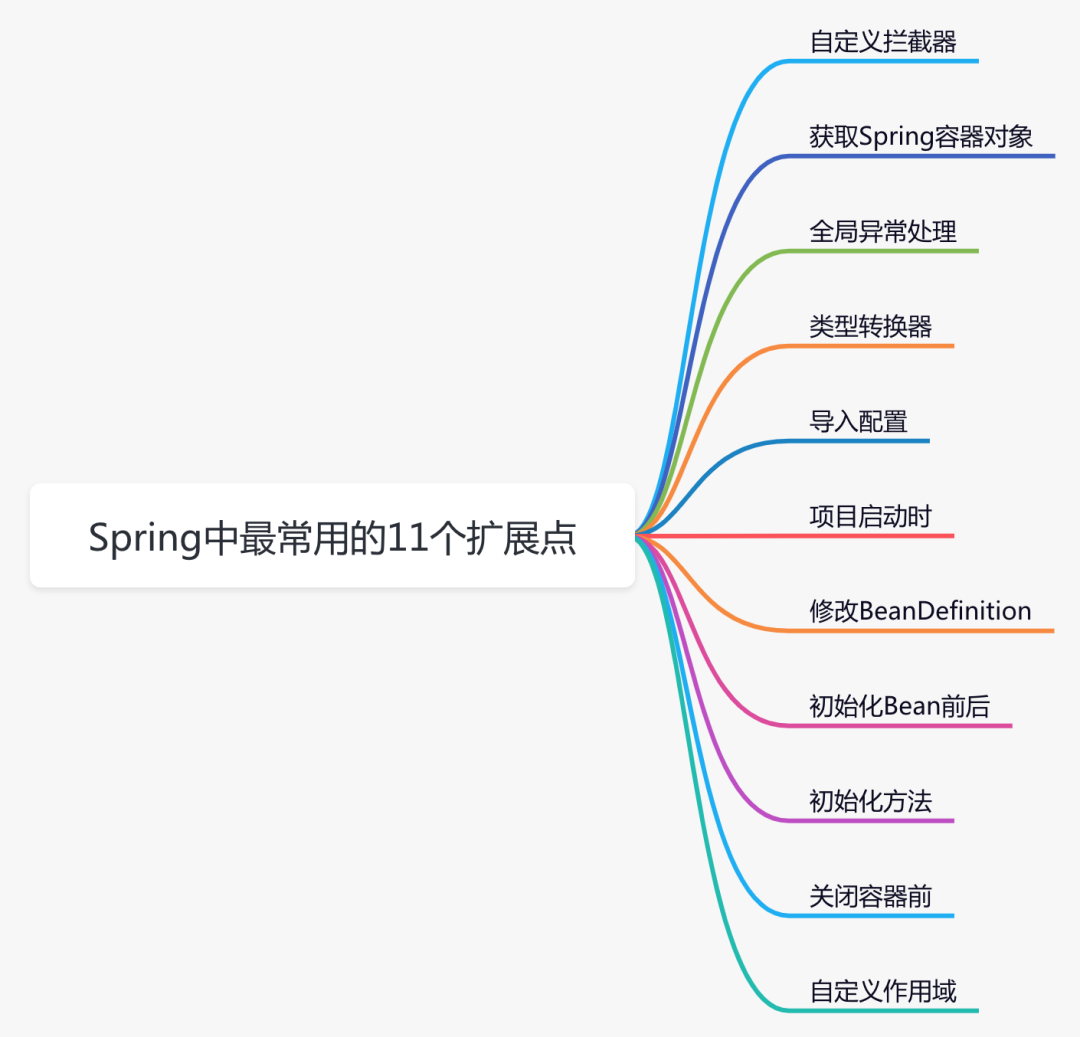

剖析Spring中最常用的扩展点(上)
电子说
描述
我们一说到spring,可能第一个想到的是 IOC(控制反转) 和 AOP(面向切面编程)。
没错,它们是spring的基石,得益于它们的优秀设计,使得spring能够从众多优秀框架中脱颖而出。
除此之外,我们在使用spring的过程中,有没有发现它的扩展能力非常强。由于这个优势的存在,让spring拥有强大的包容能力,让很多第三方应用能够轻松投入spring的怀抱。比如:rocketmq、mybatis、redis等。
今天跟大家一起聊聊,在Spring中最常用的11个扩展点。
1.自定义拦截器
spring mvc拦截器根spring拦截器相比,它里面能够获取HttpServletRequest和HttpServletResponse等web对象实例。
spring mvc拦截器的顶层接口是:HandlerInterceptor,包含三个方法:
- preHandle 目标方法执行前执行
- postHandle 目标方法执行后执行
- afterCompletion 请求完成时执行
为了方便我们一般情况会用HandlerInterceptor接口的实现类HandlerInterceptorAdapter类。
假如有权限认证、日志、统计的场景,可以使用该拦截器。
第一步,继承HandlerInterceptorAdapter类定义拦截器:
public class AuthInterceptor extends HandlerInterceptorAdapter {
@Override
public boolean preHandle(HttpServletRequest request, HttpServletResponse response, Object handler)
throws Exception {
String requestUrl = request.getRequestURI();
if (checkAuth(requestUrl)) {
return true;
}
return false;
}
private boolean checkAuth(String requestUrl) {
System.out.println("===权限校验===");
return true;
}
}
第二步,将该拦截器注册到spring容器:
@Configuration
public class WebAuthConfig extends WebMvcConfigurerAdapter {
@Bean
public AuthInterceptor getAuthInterceptor() {
return new AuthInterceptor();
}
@Override
public void addInterceptors(InterceptorRegistry registry) {
registry.addInterceptor(new AuthInterceptor());
}
}
第三步,在请求接口时spring mvc通过该拦截器,能够自动拦截该接口,并且校验权限。
2.获取Spring容器对象
在我们日常开发中,经常需要从Spring容器中获取Bean,但你知道如何获取Spring容器对象吗?
2.1 BeanFactoryAware接口
@Service
public class PersonService implements BeanFactoryAware {
private BeanFactory beanFactory;
@Override
public void setBeanFactory(BeanFactory beanFactory) throws BeansException {
this.beanFactory = beanFactory;
}
public void add() {
Person person = (Person) beanFactory.getBean("person");
}
}
实现BeanFactoryAware接口,然后重写setBeanFactory方法,就能从该方法中获取到spring容器对象。
2.2 ApplicationContextAware接口
@Service
public class PersonService2 implements ApplicationContextAware {
private ApplicationContext applicationContext;
@Override
public void setApplicationContext(ApplicationContext applicationContext) throws BeansException {
this.applicationContext = applicationContext;
}
public void add() {
Person person = (Person) applicationContext.getBean("person");
}
}
实现ApplicationContextAware接口,然后重写setApplicationContext方法,也能从该方法中获取到spring容器对象。
2.3 ApplicationListener接口
@Service
public class PersonService3 implements ApplicationListener<ContextRefreshedEvent> {
private ApplicationContext applicationContext;
@Override
public void onApplicationEvent(ContextRefreshedEvent event) {
applicationContext = event.getApplicationContext();
}
public void add() {
Person person = (Person) applicationContext.getBean("person");
}
}
3.全局异常处理
以前我们在开发接口时,如果出现异常,为了给用户一个更友好的提示,例如:
@RequestMapping("/test")
@RestController
public class TestController {
@GetMapping("/add")
public String add() {
int a = 10 / 0;
return "成功";
}
}
如果不做任何处理请求add接口结果直接报错:

what?用户能直接看到错误信息?
这种交互方式给用户的体验非常差,为了解决这个问题,我们通常会在接口中捕获异常:
@GetMapping("/add")
public String add() {
String result = "成功";
try {
int a = 10 / 0;
} catch (Exception e) {
result = "数据异常";
}
return result;
}
接口改造后,出现异常时会提示:“数据异常”,对用户来说更友好。
看起来挺不错的,但是有问题。。。
如果只是一个接口还好,但是如果项目中有成百上千个接口,都要加上异常捕获代码吗?
答案是否定的,这时全局异常处理就派上用场了:RestControllerAdvice。
@RestControllerAdvice
public class GlobalExceptionHandler {
@ExceptionHandler(Exception.class)
public String handleException(Exception e) {
if (e instanceof ArithmeticException) {
return "数据异常";
}
if (e instanceof Exception) {
return "服务器内部异常";
}
retur nnull;
}
}
只需在handleException方法中处理异常情况,业务接口中可以放心使用,不再需要捕获异常(有人统一处理了)。真是爽歪歪。
-
Spring中11个最常用的扩展点分享12023-05-11 998
-
基于spring的SPI扩展机制是如何实现的?2023-03-07 1607
-
剖析Spring中最常用的扩展点(中)2023-02-15 983
-
Spring中最常用的11个扩展点2023-01-11 1447
-
联网应用中最常用的传感器是什么?2022-08-16 1512
-
单片机系统中最常用的三种通信协议是什么?2022-02-17 1924
-
开关电源中最常用的电阻有哪些呢2021-12-29 2680
-
请问射击探测器中最常用的口径是什么?2021-04-12 1244
-
电路中最常见到的电容使用方法2021-03-17 2792
-
EMC问题中最常用的手段RC滤波详细资料说明2020-12-25 1695
-
Spring框架的设计理念2019-07-15 1559
-
数控机床插补算法中最常用的三种算法源码2016-11-08 2027
全部0条评论

快来发表一下你的评论吧 !

